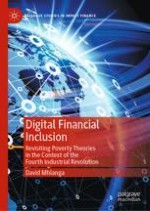2022 | OriginalPaper | Buchkapitel
9. Prospects and Challenges of Digital Financial Inclusion/Fintech Innovation in the Fourth Industrial Revolution
verfasst von : David Mhlanga
Erschienen in: Digital Financial Inclusion
Aktivieren Sie unsere intelligente Suche, um passende Fachinhalte oder Patente zu finden.
Wählen Sie Textabschnitte aus um mit Künstlicher Intelligenz passenden Patente zu finden. powered by
Markieren Sie Textabschnitte, um KI-gestützt weitere passende Inhalte zu finden. powered by
